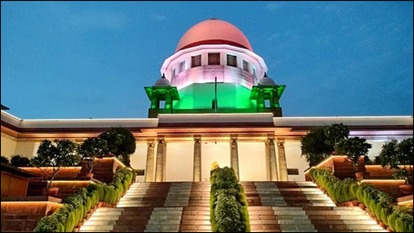
Supreme Court Rules: Writ Jurisdiction Cannot Bypass Statutory Remedies
Court says delay in filing statutory appeals cannot be excused by invoking Article 226
Verdict reinforces discipline in litigation and limits misuse of constitutional writ powers
By Our Legal Reporter
New Delhi: November 25, 2025:
In a significant judgment delivered on 21 November 2025, the Supreme Court of India clarified that litigants cannot invoke the writ jurisdiction of High Courts under Article 226 of the Constitution to bypass statutory remedies when they themselves have disabled their right by delay. The ruling came in a civil appeal challenging a Rajasthan High Court order, where the petitioner attempted to use writ jurisdiction after failing to file an appeal under the Customs Act, 1962 within the prescribed limitation period.
Also Read: Supreme Court Clarifies Governors’ Powers: No Indefinite Delay on Bills
Background of the Case
The case involved a dispute under the Customs Act. The litigant failed to file an appeal within the statutory time limit and instead approached the Rajasthan High Court under Article 226, seeking relief through writ jurisdiction. The High Court dismissed the petition, holding that writ jurisdiction cannot be used as a substitute for statutory remedies.
The matter reached the Supreme Court, where a Division Bench of Justices Dipankar Datta and Aravind Kumar upheld the High Court’s decision. The Court emphasised that when a specific statutory forum is available, especially when that forum is the High Court itself in another jurisdiction, writ jurisdiction should not be exercised to bypass the statutory machinery.
Also Read: Gratuity After One Year: Landmark Labour Law Reform Brings Relief to Millions
Key Observations of the Supreme Court
- Statutory remedies must be respected: The Court reiterated that litigants must first exhaust remedies provided under law before approaching constitutional courts.
- Delay cannot justify writ petitions: If a party disables itself by failing to act within limitation periods, it cannot later seek relief through writ jurisdiction.
- Article 226 is not a substitute: Writ jurisdiction is extraordinary and discretionary. It cannot be used to circumvent statutory appeal mechanisms.
- Judicial discipline: Courts must discourage attempts to misuse writ jurisdiction, as it undermines the legislative intent behind statutory remedies.
Why This Matters
This ruling is important because it strengthens the discipline of litigation in India. Many litigants attempt to bypass statutory forums by directly approaching High Courts under Article 226, often after missing deadlines. By clarifying that delay cannot be excused through writ petitions, the Supreme Court has reinforced the principle that law cannot reward negligence.
Also Read: India Grants First Smell Trademark: Rose-Scented Tyres Make Legal History
Impact on Litigants
- Greater responsibility: Parties must act within prescribed timelines and cannot rely on writ jurisdiction as a fallback.
- Reduced misuse: The ruling will discourage frivolous petitions filed to bypass statutory forums.
- Legal certainty: Ensures that statutory remedies remain the primary route for dispute resolution.
Impact on Judiciary
Also Read: Supreme Court Says Investigations Cannot Continue Endlessly: Right to Speedy Probe Strengthened
- Reduced burden on High Courts: By limiting misuse of writ jurisdiction, the ruling will help reduce case backlogs.
- Strengthened hierarchy: Reinforces the importance of statutory forums and appellate mechanisms.
- Judicial consistency: Aligns with earlier rulings that writ jurisdiction is discretionary and not a matter of right.
Expert Reactions
Legal experts welcomed the verdict as a necessary clarification.
- Senior advocates noted that the ruling will prevent litigants from using writ jurisdiction as a shortcut.
- Academics highlighted that the judgment strengthens the balance between constitutional powers and statutory remedies.
- Practitioners said the decision will improve efficiency in litigation by ensuring parties respect statutory timelines.
Broader Context
This ruling builds on earlier Supreme Court precedents that limited writ jurisdiction when statutory remedies are available. The Court has consistently held that Article 226 is meant for extraordinary cases involving violation of fundamental rights or lack of alternative remedies.
By explicitly stating that delay cannot justify writ petitions, the Court has closed a loophole often exploited by litigants. This aligns with global principles of judicial discipline, where extraordinary jurisdiction is reserved for exceptional circumstances.
Conclusion
The Supreme Court’s ruling that writ jurisdiction cannot be invoked to bypass statutory remedies when a party disables itself by delay is a landmark in Indian constitutional law. It reinforces the principle that justice must be pursued diligently and within the framework of statutory remedies.
By upholding the Rajasthan High Court’s decision, the Supreme Court has sent a clear message: litigants must respect statutory timelines and cannot misuse constitutional writ powers as a substitute for negligence.
This verdict strengthens judicial discipline, reduces misuse of writ jurisdiction, and ensures that statutory forums remain the backbone of India’s legal system.
GEO Keywords
- Supreme Court writ jurisdiction delay ruling
- Writ jurisdiction cannot bypass statutory remedy India
- Article 226 writ jurisdiction Supreme Court
- Rajasthan High Court writ petition case
- Customs Act statutory remedy Supreme Court
- Justice Dipankar Datta Aravind Kumar ruling
- Supreme Court writ jurisdiction November 2025
- Delay in filing appeal writ jurisdiction India
- Statutory remedies vs writ jurisdiction India
- Supreme Court limits misuse of writ powers